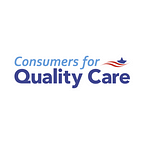The pandemic might be winding down, but predatory hospital practices linger
By Former Rep. Donna Christensen, Consumers for Quality Care Board Member
As the public health crisis begins to wane in the United States and we continue our national recovery, there is a lot to be optimistic about when it comes to health care. More Americans have insurance coverage than ever before, thanks to the Affordable Care Act. Effective COVID-19 vaccines are helping to keep Americans safe. However, despite the ravaging economic and health effects from the pandemic, alarming new studies show that hospitals are astronomically marking up their prices and are still targeting the patients who can’t afford their steep bills with predatory collection practices.
Recent polling by ALG Research and Public Opinion Strategies on behalf of CQC found that more than 8-in-10 Americans believe that COVID-19 has exposed flaws in our current health care system. On top of that, consumers remain concerned about the high cost of health care, especially when it comes to out-of-pocket costs. Premiums, copays and deductibles top the list of concerns with Americans’ own health care (57%), as well as unpredictable medical bills (38%).
These concerns around costs and surprise bills predate the pandemic. Year-over-year, the cost of hospital care has increased, and as patients have become responsible for more out-of-pocket costs, some hospitals have been responding with aggressive, predatory billing practices.
A new analysis by Axios using data from Johns Hopkins University finds that more than a quarter (26) of the 100 highest revenue hospitals in the United States sued patients over unpaid medical bills between 2018 and mid-2020. Additionally, hospitals targeted patients with wage garnishments and liens to recoup unpaid medical debt.
Non-profit hospitals are among the worst offenders of these toxic billing practices. Between 2018 and mid-2020, Froedtert Hospital in Milwaukee, a non-profit hospital, filed over 3,000 court actions and pursued more than $15 million from patients. Nearly two-thirds of hospitals that sued patients were non-profits, despite the ACA requiring non-profit hospitals to offer financial assistance and barring “extraordinary debt collection” in many instances. Given their tax-exempt status, non-profit hospitals should be meeting their end of the bargain when it comes to charity care, but the data clearly shows a different story.
To make matters worse, many hospitals with the highest revenues in the country are also charging the most for care. Hospitals determine their own charges, also known as list prices. Despite federal law requiring them to list their prices, hospitals have largely failed to comply with price transparency requirements and some even previously took steps to shield their prices from web searches. These tactics create immense uncertainty for consumers when it comes to the cost of their care, and ultimately, leaves some with out-of-control medical bills post-care.
Of the top 100 largest hospitals, 57 marked up their prices by more than 5x of the actual cost of care they provided. Sunrise Hospital & Medical Center in Las Vegas was found to have an average bill markup of nearly 13x — the second largest in the entire study. Numerous hospitals in Pennsylvania, including the Hospital of the University of Pennsylvania, were found to have markup rates over 7x higher.
Hospital predatory billing practices and markups are bad news for consumers, making quality health care unaffordable. Unfortunately, even while Americans are dealing with the effects of a pandemic, these practices are still widespread. If we as a nation have learned one thing over the past year, it is that we must do everything we can to make care accessible for all patients. Hospitals must put an end to these harmful policies, and CQC will fight to ensure that our leaders put forth solutions that will address hospitals’ high prices and toxic billing practices.
The Honorable Donna M. Christensen is a founding member of the Consumers for Quality Care board. She retired in 2015 from the U.S. House of Representatives, where she served nine terms. She is the first female physician in history to serve in the U.S. Congress.
